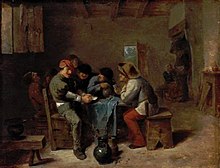Pile up
Ridging is a simple game of chance with cards . Other names for this game are packet turn , Dutch bank or Engl. Dutch Bank , Banker and Broker and Blind Hookey .
Rules of the game
The banker shuffles, lets draw, places any number of piles of cards face down on the table and keeps one of the punchers' choice for himself; the punchers bet on the rest.
The bottom cards of the pile decide on profit and loss: if the bottom card of a pile is higher than the banker's card, the pointer wins in a ratio of 1: 1; however, if the bottom card is the same or lower in the range, the banker wins.
Bank advantage
Two cards decide whether a set is won or lost:
- If the banker's and the pointer's cards are different, the banker and the pointer have a probability of ½ win and neither side has an advantage.
- However, if the two cards in the range are the same, the banker wins : the probability that a pair will fall when two cards are drawn from a pack of 52 is 3: 51 or 1/17 = 5.9%. If you are playing with a package of 32, the probability is 3: 31 = 9.7%.
The bank advantage is thus
- 5.9% when using a pack of 52 cards
- 9.7% when using a package of 32 cards
If the banker withdraws only half of the stake in the case of cards of the same rank, the bank advantage drops to 1/34 = 2.9% when using a package of 52 cards or to 3/62 = when using a package of 32 cards 4.8%.
literature
- Meyers Konversationslexikon from 1908
